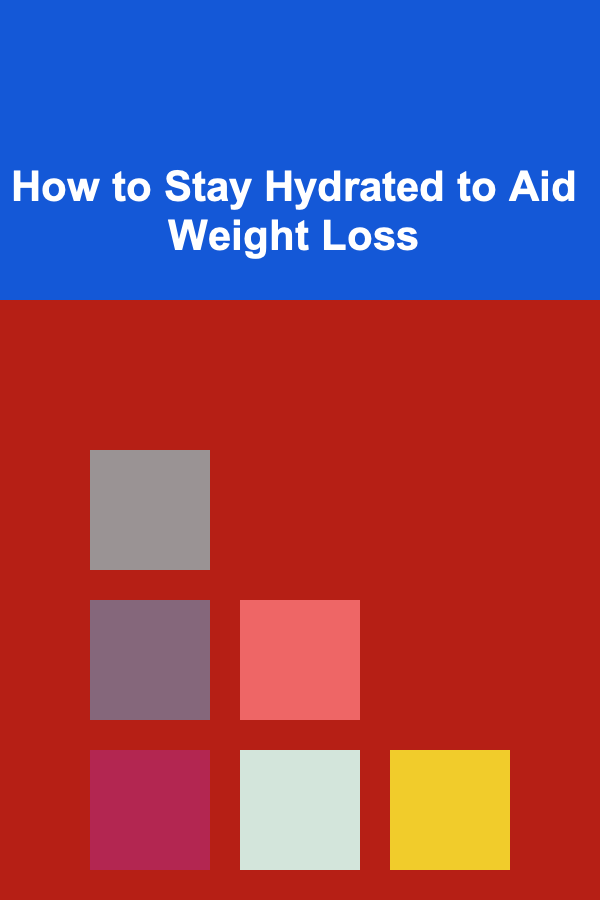
How to Stay Hydrated to Aid Weight Loss
ebook include PDF & Audio bundle (Micro Guide)
$12.99$11.99
Limited Time Offer! Order within the next:

When it comes to weight loss, most people focus on exercise routines, calorie restriction, and diet modifications. However, an often-overlooked yet equally important factor is hydration. Staying properly hydrated plays a significant role in the body's ability to burn fat, manage hunger, and maintain overall health. In this article, we'll explore the science behind hydration and its impact on weight loss, how to stay hydrated effectively, and the best strategies to make hydration a key component of your weight loss plan.
The Role of Hydration in Weight Loss
Before we delve into practical tips for staying hydrated, it's important to understand the science behind hydration and how it can impact weight loss efforts. Proper hydration supports several physiological processes, and its relationship with weight loss is rooted in the way it affects metabolism, appetite regulation, and fat-burning processes.
1. Metabolism Boost
One of the key ways hydration aids in weight loss is by supporting your metabolism. When you're dehydrated, your body's metabolic rate can slow down. This means that the process of converting food into energy becomes less efficient, potentially leading to the storage of excess fat. Hydration helps keep the metabolic process running smoothly.
Drinking water, particularly cold water, may have an additional benefit. Some studies suggest that consuming cold water can slightly increase energy expenditure as the body uses energy to warm the water to body temperature. Although this increase in calorie burn is small, it's a step in the right direction when trying to lose weight.
2. Appetite Control
Dehydration can often be confused with hunger. When you're thirsty, your body may send signals that are interpreted by your brain as hunger, leading you to eat more than necessary. This is particularly problematic for people trying to control calorie intake for weight loss. Drinking water regularly can help keep these false hunger signals at bay, making it easier to stick to your weight loss plan.
Additionally, drinking water before meals can help you feel fuller, which may reduce the amount of food you consume. Some studies have shown that drinking water before meals can lead to a decrease in calorie intake and may contribute to long-term weight loss.
3. Fat Burning
Water is essential for the breakdown of fat cells in the body. When you are well-hydrated, the body can more efficiently transport nutrients to the cells and remove waste products. Hydration also helps the kidneys function properly, which aids in flushing out toxins and reducing the burden on other organs like the liver that help with fat breakdown.
Furthermore, hydration can assist in the process of lipolysis, which is the breakdown of fat for energy. Without adequate water, the body's fat-burning processes can slow down, hindering weight loss progress.
4. Detoxification
Drinking enough water ensures that your kidneys function optimally, removing waste products and toxins that could otherwise impair fat metabolism. The more effectively your body can detoxify itself, the better it can burn fat and maintain optimal health.
How Much Water Should You Drink for Weight Loss?
The amount of water you should drink varies depending on several factors, including your body size, activity level, and climate. A common recommendation is to drink at least eight 8-ounce glasses of water per day, also known as the "8x8 rule." While this is a good baseline, your hydration needs may differ.
1. Body Weight and Activity Level
People who weigh more may need more water to stay hydrated because their bodies have more mass to hydrate. Similarly, active individuals who sweat more during exercise will need additional fluids to replenish what is lost through sweat.
As a general rule, you can aim for drinking around half an ounce to an ounce of water for every pound you weigh. For example, if you weigh 150 pounds, you should aim to drink between 75 to 150 ounces of water a day. If you exercise regularly, add about 12 ounces of water for every 30 minutes of intense exercise.
2. Climate and Environment
Your hydration needs also depend on the climate you live in. If you live in a hot and humid environment, you will lose more water through perspiration and need to drink more to compensate. Similarly, if you are in a high-altitude area, your body may become dehydrated more quickly, so you should increase your water intake.
Best Ways to Stay Hydrated
Now that we understand the importance of hydration in the context of weight loss, let's explore the best ways to stay hydrated. It's not just about drinking water; there are several strategies you can adopt to ensure that you're consistently hydrated throughout the day.
1. Drink Water First Thing in the Morning
Start your day by drinking a glass of water as soon as you wake up. After hours of sleep, your body is likely dehydrated, and hydrating first thing helps to jumpstart your metabolism and prevent false hunger signals. Drinking water in the morning can also help replenish the fluids lost through sweating and breathing during sleep.
2. Carry a Reusable Water Bottle
One of the easiest ways to stay on top of your hydration goals is to carry a water bottle with you everywhere you go. Keeping a bottle within arm's reach encourages you to drink more often. Set a reminder on your phone or add a water tracker to your fitness app to remind you to drink water regularly throughout the day.
Having a water bottle nearby is particularly useful during exercise. Drinking water before, during, and after your workout ensures that you stay hydrated, helping to maintain energy levels and improve performance.
3. Drink Water Before Meals
As mentioned earlier, drinking water before meals can help control your appetite. Aim to drink a glass of water 20-30 minutes before eating. This can help reduce overeating and make you feel fuller with fewer calories. It's especially effective for people who are trying to reduce their calorie intake to lose weight.
4. Infuse Your Water with Flavor
If plain water feels boring, consider infusing it with natural flavors. Adding slices of fruits like lemon, cucumber, or berries can make your water more enjoyable without adding extra calories or sugar. Herbal teas and sparkling water are also excellent alternatives to plain water, as long as they're free of added sugars and artificial sweeteners.
5. Drink Water During Exercise
Exercise increases the need for hydration, so it's important to drink water during your workouts. Dehydration during exercise can lead to fatigue, reduced performance, and even injury. If you're engaging in intense physical activity, consider replenishing with an electrolyte solution to restore lost minerals.
6. Consume Water-Rich Foods
In addition to drinking water, you can stay hydrated by eating water-rich foods. Many fruits and vegetables have high water content and can help contribute to your hydration goals. Some examples of water-rich foods include watermelon, cucumbers, celery, strawberries, and oranges. Including these foods in your diet can keep you hydrated and add valuable nutrients to your meals.
7. Set Hydration Goals and Track Intake
To ensure you're staying on top of your hydration, set specific daily water intake goals. This will help you monitor your progress and stay accountable. You can use apps or hydration tracking devices that help you log your water intake and remind you to drink throughout the day. Tracking your hydration can also help you assess whether you're consuming enough water to support your weight loss efforts.
Common Hydration Mistakes to Avoid
While staying hydrated is essential for weight loss, there are a few common mistakes people make when it comes to hydration. These mistakes can undermine your efforts, so it's important to be aware of them.
1. Relying on Sugary Drinks
Many people turn to sugary beverages like sodas, juices, and flavored coffees to stay hydrated. However, these drinks are high in calories and sugar, which can hinder your weight loss efforts. Instead, opt for water, herbal teas, or flavored water with minimal added sugar.
2. Not Drinking Enough Water During Exercise
Exercise increases your need for hydration, and failing to drink water before, during, and after a workout can lead to dehydration, reduced performance, and fatigue. Always carry water with you when exercising and drink frequently to stay hydrated.
3. Ignoring Electrolyte Balance
While water is important for hydration, it's also essential to maintain a proper balance of electrolytes. Electrolytes like sodium, potassium, and magnesium help regulate fluid balance in the body, especially during intense physical activity. If you're engaging in prolonged or intense exercise, consider drinking beverages that contain electrolytes to prevent dehydration.
Conclusion
Staying hydrated is a crucial yet often overlooked component of a successful weight loss strategy. Proper hydration helps support metabolism, control appetite, promote fat burning, and enhance overall health. By drinking sufficient water, incorporating water-rich foods, and maintaining hydration during exercise, you can make hydration an effective tool in your weight loss journey.
Remember that hydration needs vary from person to person based on body weight, activity level, and environmental factors. The key is to listen to your body and drink when you're thirsty. Staying hydrated is not a one-time effort; it's about consistency and making hydration a habit that supports your long-term weight loss and health goals.
Reading More From Our Other Websites
- [Organization Tip 101] How to Organize Your Home for Stress-Free Entertaining
- [Home Pet Care 101] How to Create an Emergency Plan for Your Pet in Case of Natural Disasters
- [Organization Tip 101] Affordable Coastal Home Decor Ideas for a Relaxed, Beach-Inspired Look
- [Rock Climbing Tip 101] Safety First: Essential Etiquette and Gear Tips for Indoor Climbing Gyms
- [Home Soundproofing 101] How to Soundproof a Shared Wall in a Duplex or Townhouse
- [Home Budget 101] How to Find Hidden Costs in Your Monthly Bills
- [Home Cleaning 101] How to Create Natural Cleaning Recipes for a Chemical-Free Home
- [Survival Kit 101] Self-Reliance vs. Dependence: Finding the Balance for Personal Growth
- [Home Budget 101] How to Create a Budget Plan That Works for Your Home Finances
- [Simple Life Tip 101] Best Low‑Tech Productivity Tools to Streamline a Simpler Daily Workflow

How to Make a Checklist for Conducting Website SEO Audits
Read More
How to Market Your Home Rental Property to Target the Right Tenants
Read More
How to Soundproof Your Home for a More Relaxing Environment
Read More
How To Protect Yourself from Online Scams
Read More
How To Explore Next-Generation Sequencing for Diagnostics
Read More10 Tips for Maximizing Investment Income Tracking Efficiency
Read MoreOther Products

How to Make a Checklist for Conducting Website SEO Audits
Read More
How to Market Your Home Rental Property to Target the Right Tenants
Read More
How to Soundproof Your Home for a More Relaxing Environment
Read More
How To Protect Yourself from Online Scams
Read More